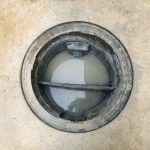For restaurant owners and managers, the last things on their minds are grease and plumbing. However, these two can combine forces to create massive headaches, resulting in costly repairs and even shutdowns. Ensuring that drain lines are free of clogs and blockages and the grease interceptor is properly functioning will alleviate these concerns.
Why do restaurants need to pump these grease interceptors? First and foremost, it’s the law! Every city has municipal codes that strictly dictate that a grease interceptor must be pumped out completely. Most codes state that a pump out must occur every 90 days. Full evacuation of the contents inside the grease interceptor must be removed. Also, all documented paperwork must be kept on file in case a city inspector asks to see it. Fines can be given if these violations happen—Fort Worth, Texas, for example, can fine restaurants $2,000 per day per violation.
So, what does this pump out ensure? Mostly, it will reduce the risk of blockages in the drain lines that could lead to a Sanitary Sewer Overflow (SSO). If the grease inside the interceptor blocks either the pipe leading to or away from the interceptor, the grease has only one way to go… and that is up—up through manhole lids or clean out covers. This will cause the spillage of rancid grease onto parking lots, grassy areas or other public areas. SSOs are reportable offenses to local and state authorities, and fines will be implemented. For example, Seattle, Washington, can fine restaurants $500 to $5,000 per violation, depending on the amount of grease spilled.
A neglected grease interceptor can also lead to nuisance odors that many guests will find unpleasant. The longer food particles and grease stay inside an interceptor, the more likely volatile gases and hydrogen sulfide are to emit from the interceptor. Depending on the location of the interceptor and the wind direction that day, the full effect of the odors can interrupt the lunch rush or dinner hour. In addition, insects, such as cockroaches and crickets, can live and breed inside the grease, which could cause an infestation inside the restaurant. Grease can also harden over time, making the cleaning much more difficult and probably less effective.
A regularly scheduled grease interceptor pump out will help restaurants remain fully functioning to continue to serve guests meals. It will help reduce the risk of blockages and SSOs and nuisance odors that lead to customers complaints. Proper pump outs will also keep owners and managers in compliance with the local laws.
Our representatives at Chemsearch FE are extremely knowledgeable about many facility maintenance areas. If you would like to further discuss facility solutions with one of our resource management experts, please click here and we will get someone in touch with you soon.






